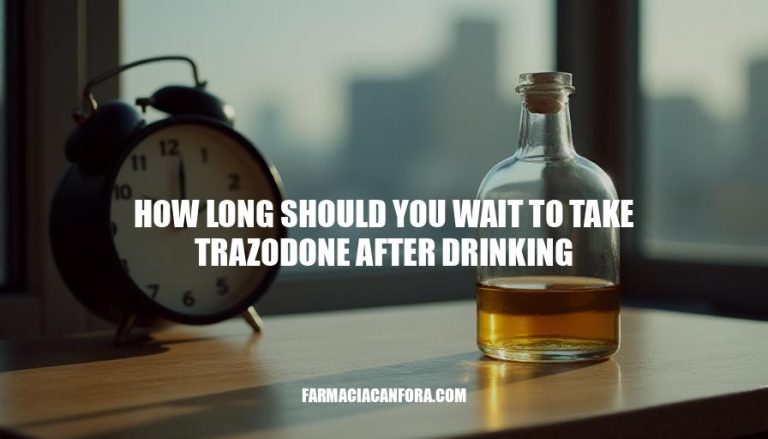


Trazodone is a medication used to treat depression and sometimes insomnia or anxiety. It helps balance serotonin in the brain, which can improve mood and sleep. But it’s not safe to take with alcohol because it can make you very drowsy and increase your risk of falls and injuries.
When trazodone and alcohol are combined, they can cause serious problems like slowed breathing, heart rate issues, and even overdose or death.
Long-term use can also lead to depression, liver damage, and physical dependence.
To stay safe, it’s essential to know how long to wait after drinking before taking trazodone. A general rule is to wait at least one hour for each drink you’ve had. But this time may vary depending on your age, weight, and overall health.
It’s always best to talk to a healthcare provider for personalized advice.
Trazodone and alcohol both act as central nervous system (CNS) depressants, meaning they slow brain activity and can cause excessive sedation, dizziness, and impaired motor function when combined. The time required to safely take trazodone after drinking depends on several factors:
Individual Metabolism: The liver processes alcohol at an average rate of one standard drink per hour. However, metabolism varies based on genetics, age, liver health, and enzyme efficiency.
Amount of Alcohol Consumed: More alcohol requires more time for complete elimination.
If someone consumes two drinks, waiting at least two hours before taking trazodone is generally advised.
General Health Conditions: Liver disease, kidney function, and overall health impact alcohol metabolism. Individuals with compromised liver function may need significantly more time to clear alcohol from their system.
Medication Half-Life: Trazodone has a half-life of approximately 10 hours, meaning it remains in the body for an extended period. Combining it with alcohol can amplify its sedative effects.
Avoid Mixing: Medical professionals strongly advise against taking trazodone with alcohol due to increased risks of falls, slowed breathing, overdose, and worsened depression.
Recommended Waiting Time: Some sources suggest waiting at least two hours per drink before taking trazodone.
Others recommend a more conservative approach, waiting until alcohol is fully metabolized, which can take up to 24 hours depending on consumption levels.
Long-Term Risks: Chronic alcohol use combined with trazodone may lead to liver damage, increased physical dependence, and withdrawal symptoms.
Alcohol alters brain chemistry and impairs cognitive function. Trazodone enhances serotonin activity, and combining the two can result in extreme drowsiness, confusion, and respiratory depression. Waiting ensures alcohol is fully processed, reducing the likelihood of dangerous interactions.
For personalized medical advice, consulting a healthcare provider is essential.
If adverse effects occur, immediate medical attention is recommended.
1hellopharmacist.com2www.goodrx.com3americanaddictioncenters.org4www.choosingtherapy.com
When considering how long to wait before taking trazodone after drinking, it’s essential to follow these guidelines:
Trazodone has a half-life of approximately 10 hours, meaning it remains in the body for an extended period and can amplify its sedative effects when combined with alcohol.
Medical professionals strongly advise against taking trazodone with alcohol due to increased risks of falls, slowed breathing, overdose, and worsened depression. Waiting until alcohol is fully metabolized, which can take up to 24 hours depending on consumption levels, is recommended.
Chronic alcohol use combined with trazodone may lead to liver damage, increased physical dependence, and withdrawal symptoms.
Alcohol alters brain chemistry and impairs cognitive function, while trazodone enhances serotonin activity. Combining the two can result in extreme drowsiness, confusion, and respiratory depression. Waiting ensures alcohol is fully processed, reducing the likelihood of dangerous interactions.
For personalized medical advice, consulting a healthcare provider is essential. If adverse effects occur, immediate medical attention is recommended.